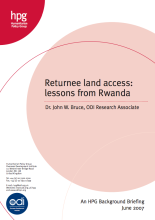Land Library
Welcome to the Land Portal Library. Explore our vast collection of open-access resources (over 74,000) including reports, journal articles, research papers, peer-reviewed publications, legal documents, videos and much more.
/ library resources
Showing items 1 through 9 of 9.Rwanda is developing at a remarkably rapid pace, and with that development has come a multitude of corresponding changes to the orientation and use of land throughout the country.
This Policy Brief summarizes the main findings and recommendations of qualitative and quantative research on implementation and outcomes of the 2007 Expropriation Law in Rwanda.
The biofuel boom has become a core issue in Zimbabwean land and development debates. Biofuels require large tracts of land for production; and the land acquisition programmes by the various state, non-state actors and individuals have been termed ‘land grabbing’.
Up to one quarter of the world’s population is estimated to be landless, including 200 million
people living in rural areas,1
and approximately 75% of the world’s population living in extreme
poverty (less than $1/day) live in rural areas.2
This background briefing reports on a study of land access for returnees in Rwanda, and the impacts of land access policies in the post-conflict period.
This background briefing reports on a study of land access
for returnees in Rwanda, and the impacts of land access
policies in the post-conflict period. It also seeks to
understand better the roles international humanitarian
This report is part of a broader comparative effort by As the author worked with colleagues in Rwanda,
two other important dimensions of the Rwandan
experience became clear. Refugee return and land
access in Rwanda has been an extraordinarily
Conflits armés et crises alimentaires contribuent à leur manière à urbaniser
l’Afrique sub-saharienne lorsque les villes jouent un rôle de refuge et que les combats
se déroulent à la campagne. Malgré l’évacuation de ses habitants lors de la chute du
To accommodate the needs of hundreds of thousands of returnees after war and fgenocide in 1994, the new Rwandan Government launched a settlement programme, Imidugudu.








